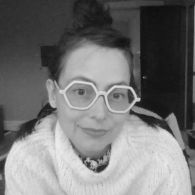Party as Form Origin Story: A Causerie, not a Treatise
Party As Form is a topic inextricably linked to the place where I am now the Executive Director, Ox-Bow School of Art & Artists’ Residency, and to my experience of “arts administration.” The idea emerged while I was deep in the work of creating Threewalls, a non-profit art space in Chicago. Threewalls was a place that felt experimental and playful, but also restrictive and “professional.” The theme parties we threw each year to raise money were an annual creative release, and in contrast to the work of day-to-day caretaking in arts administrative work, they emerged as a kind of “erotics”— a cumulative moment of pleasure and play in order shore up the energy (and cash) to keep going another year.
I connected this practice to Ox-Bow when I was first invited to teach in 2010 for a winter session. Kathryn Hixon—a beloved Chicago art historian, writer, and curator—had passed away in the fall, leaving her class on Utopias still on the schedule at Ox-Bow. I was asked to come and fill in.
It was through the lens of that class, in which students explore two sides of the same coin (utopia and dystopia) that party emerged as an artistic “form.” Arend deGruyter-Helfer, a student, made for the class a “sad rave” – which used the large open plan painting classroom as a dance club using only a handful of partially deflated balloons, Capri Sun laid out on a six-foot plastic folding table, and a lone boom-box playing some blown-out bass line. The lights were dimmed and there may or may not have been a small pathetic disco ball. The material details, or lack thereof, were important, but my precision in describing them is not. What resonated was the atmosphere they created: the unfulfilled potential of the party or the possibility of potential in it, even with barest gestures towards celebratory community. The fact was, we as a class enjoyed this party. Was it because we were in on the joke? Or was there simply enough space for us to fill it with the instincts of the social animal? We moved to save this party from being sad and embraced Arend’s proposal with seriousness and glee. And so we partied. Just a little bit.
Surrounding us those two weeks were the other built-in conditions of Ox-Bow, an environment that lent itself well to the topic. Ox-Bow is in a way its own utopian experiment—a school and artist residency nestled in nature. Founded in 1910, it has always been run by artists, who keep the school together with sweat equity, a shoestring budget, and plenty of hope. It had stumbled along most of its life as most artist-run experiments do, first as a project held-in-common, then in 1974 as a non-profit. It broke down many times over, but it always hung on.
Ox-Bow was and is (as many artist residencies are) an escape from day-to-day life. Countless artists made their way, primarily from Chicago, to this antidote to urban living in western Michigan for the chance to make art on the lakeshore. From the beginning, in addition to the serious play of art making, there were parties. Pictures in our archives from the first decade of the school show a wide variety of costume play— men in drag, mock-weddings, and a Venetian boat festival all feature in snapshots left by the founding participants. Eventually costume play made it solidly into the culture, as (date of origin unknown), Friday night thematic dance parties became a regular feature. Old favorites like “Fake Naked” and “Goth Prom” were annual occurrences, but otherwise, each summer a new crop of themes was delivered up and voted on by the summer staff and fellows. The dance parties became a reliable end-of-the-week release where a rotating cast of DJs played. Everyone—students, faculty, staff, and visiting artists— arrives after feverishly assembling a costume for the night’s theme. And while some stay by the campfire, or stayed back altogether, at some point in the evening the bulk of the campus comes together for this ritual of liberation.
By the time I taught at Ox-Bow, directing Threewalls had already eclipsed any art-making practice I had intended to have after graduate school. My work founding a non-profit and working with my art community had become my creative practice, and while it was mostly satisfying and very all-consuming, there was one area that allowed me the somewhat unfettered play of the studio: our annual benefit. These benefits became my (unacknowledged) creative outlet as each year, I came up with goofy themes and hunted down venues like a Hollywood location scout. This was the play I needed to find balance.
I proposed the class Party as Form to Ox-Bow to think about the peculiarities of the party’s liminal space, why we need it, why we make it, and what it might do for us as people both independently and in community. I proposed it to draw connections between play and the studio, the party and art practices. I also proposed it to think about the work of hospitality—the preparation and work of hosting, a craft that is as applicable to throwing a good event as it is to leading a classroom. And of course, I wanted to contemplate the host’s corollary, the guest. How can we be good guests?
My intentions were to find out what we might learn from the party by studying it and its components from theory to practice, from planning to partying. What of the party might be conveyed back to our routine lives, to enrich it and challenge it, to give us a lens to imagine and practice being together differently? It was a class that was less about a material outcome and more of a collective process of discovery. It was rewarding that in the end so many students have circled back to me over 10+ years to tell me it changed their life, that they think about and apply its lessons daily.
I would, to be honest, like to take my own class again. I wish I could go back in time and visit it as a student and relive these experiments knowing what I do now about where we as a society would be today: chronically online, disconnected, disillusioned, losing our compassion. Maybe that’s not your list— and there’s maybe a dozen more things I’d add— the point is, I think there is something about being together that needs relearning. And there is something in the discomfort of being together that we need to embrace. I am ready to be a student of this, and luckily, I am every summer that I’m on campus at Ox-Bow.
The torch for the concept has also been passed. Kelly Lloyd taught the next iteration of the class with Alex Chitty. Alberto Aguilar will teach it summer 2025 with Maria Burundarena. Sara Clugage, Matilda Moors and PRAKSIS are editing this edition of Dilettante Army after a group of us gathered in Oslo last summer for the first Party As Form residency at PRAKSIS. Everyone makes something new of this idea of “party as form” and as it unfolds, I wonder if the topic is just, how to be in community? At least through the lens of the party we can approach this lifelong dilemma, that people and relationships are hard. Perhaps the party is the erotics of relating, a way to make us fall in love and find pleasure in the other.



Dilettante Mail
Get updates from us a few times a year.